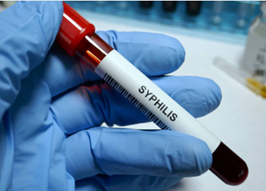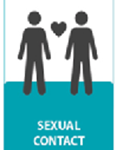Syphilis

What is Syphilis?
A highly contagious sexually transmitted bacterial infection characterized by painless sore on the genitals, rectum or mouth.
Syphilis is a sexually transmitted infection (STI) caused by bacteria that moves into the bloodstream. It is treatable and curable with the correct antibiotics.
How is it spread?
Syphilis spread from person to person through anal, oral, and vaginal sexual contact, by sharing unclean sex toys or by sharing injection drug equipment with someone who is infected. A syphilis infection can occur in the rectum, throat, or penis and vagina. A pregnant woman will pass the infection to her unborn baby.
Who is at risk for syphilis?
Anyone who is sexually active or shares unclean sex toys or drug injection equipment can get syphilis. Risk factors for syphilis include:
- Having a partner with syphilis.
- Men who have sex with men.
- Transgendered women.
- Anyone not using a condom or incorrect condom usage.
- Being Black or Hispanic.
- Anyone with new or multiple partners.
- Anyone with a partner who has other partners.
- Anyone who infrequent tests for infections.
How can I lower my risk of getting syphilis?
Everyone can lower risk of infection by practicing safe sex.
- Always use a condom. Condoms used properly reduce but do not eliminate risk.
- Maintain a monogamous relationship with someone who has been tested and does not have an infection.
- Reduce number of partners. Having multiple partners greatly increases risk of infection.
- Talk to your partner and healthcare provider about your sexual activity.
- Get tested regularly.
 What are the stages and symptoms of syphilis?
What are the stages and symptoms of syphilis?
Syphilis develops in stages and each stage has different symptoms. Because symptoms mimic other infections, many people miss the signs of infection. Additionally, all people do not develop symptoms. This is why regular testing is so important.
The time between exposure to the infection and when symptoms develop, called the incubation period, is 10 to 90 days, with an average of 3 weeks.
Syphilis Symptoms
 Primary Syphilis – A single painless sore or multiple sores usually develop 3 weeks after sex with an infected person. The sore appears at the location of sexual contact, e.g., penis, vagina, anus, rectum, lips or mouth. The infected person is highly contagious. The sore will go away without treatment.
Primary Syphilis – A single painless sore or multiple sores usually develop 3 weeks after sex with an infected person. The sore appears at the location of sexual contact, e.g., penis, vagina, anus, rectum, lips or mouth. The infected person is highly contagious. The sore will go away without treatment.
Secondary Syphilis – Sores may still be present. Secondary symptoms include skin rashes, fever, swollen lymph nodes, sore throat, headaches, muscle aches, fatigue, weight loss, mucous or white patches on tongue, or patchy hair loss that develop between 6 weeks and 6 months after sex with an infected person. The infected person is highly contagious. Symptoms will eventually go away without treatment.
Early Latent Syphilis – No visible signs are present, but the syphilis infection remains in the body. The infected person is no longer contagious. This stage occurs at more than 6 months to less than 12 months after sex with an infected person. Without treatment, syphilis remains in the body.
Latent Syphilis – No visible signs are present, but the syphilis infection remains in the body. This stage is more than 12 months after sex with an infected person. Without treatment, syphilis remains in the body.
Neurosyphilis – Can occur at any time. Syphilis can spread to the brain and nervous system. Symptoms include severe headache, trouble with muscle movements, or changes to your mental state.
Ocular syphilis – Can occur at any time. Symptoms include eye pain or redness, changes in your vision such as blurriness or vision loss.
Otosyphilis – Can occur at any time. Symptoms include hearing loss, ringing or buzzing in the ears or dizziness or vertigo (feels like your surroundings are spinning)
Please note: Neurosyphilis, ocular syphilis and otosyphilis require IMMEDIATE medical attention. Immediately seek treatment at a hospital Emergency Room.
 What test is done to diagnose syphilis?
What test is done to diagnose syphilis?
Syphilis is diagnosed through a blood test. Two tests should be done, 1) RPR with titer, and 2) treponemal pallidum antibody. The blood sample is sent to a lab and results are provided within a few days to a week.
Full STI testing (chlamydia, gonorrhea, herpes, syphilis, trichomoniasis, and HIV) is recommended for all people who are sexually active. Full testing is recommended with every new partner.
 Schedule an appointment at Lexington-Fayette County Health Department’s STI Clinic
Schedule an appointment at Lexington-Fayette County Health Department’s STI Clinic
Lexington-Fayette County Health Department operates a specialty STI Clinic that will test, diagnose and treat those exposed to or with current STIs.
What is the treatment?
The Center for Disease Control and Prevention recommends the following treatment.
Primary, Secondary and Early Latent
- Preferred: Benzathine penicillin G (Bicillin L-A) 2.4 million units once
- Note: Bicillin in the ONLY recommended treatment in pregnant women.
- Alternative: Doxycycline 100 mg orally twice daily for 14 days
- Refrain from all sexual activity (including oral sex) until all medicine is completed plus two weeks because you can still spread the infection. It takes time for the medicine to kill the infection and for symptoms to clear up.
Latent Syphilis or Unknown Stage
- Preferred: Benzathine penicillin G (Bicillin L-A) 2.4 million units once weekly for 3 weeks (7.2 mu total)
- Note: Bicillin in the ONLY recommended treatment in pregnant women.
- Alternative: Doxycycline 100 mg orally twice daily for 28 days
- Refrain from all sexual activity (including oral sex) until all medicine is completed plus two weeks because you can still spread the infection. It takes time for the medicine to kill the infection and for symptoms to clear up.
Retesting
 Everyone should have another blood test (retest) done 4 to 6 months after completing the medicine to make sure the treatment has worked. Two tests should be done, 1) RPR with titer, and 2) treponemal pallidum antibody. Lexington-Fayette County Health Department’s specialty STI Clinic provides retests.
Everyone should have another blood test (retest) done 4 to 6 months after completing the medicine to make sure the treatment has worked. Two tests should be done, 1) RPR with titer, and 2) treponemal pallidum antibody. Lexington-Fayette County Health Department’s specialty STI Clinic provides retests.
Reinfection
 Syphilis will not go away on its own. Without treatment, you and your partner will continue to spread the infection back and forth. All sexual partners need to be tested and treated for the infection, even if they have no symptoms.
Syphilis will not go away on its own. Without treatment, you and your partner will continue to spread the infection back and forth. All sexual partners need to be tested and treated for the infection, even if they have no symptoms.
What happens if I don’t get treatment?
- Disease complications can occur when an infection is untreated or treatment is delayed. Syphilis can cause serious health problems, such as neurosyphilis, without treatment.
- Untreated syphilis increases your chances of getting other sexually transmitted diseases including HIV.






